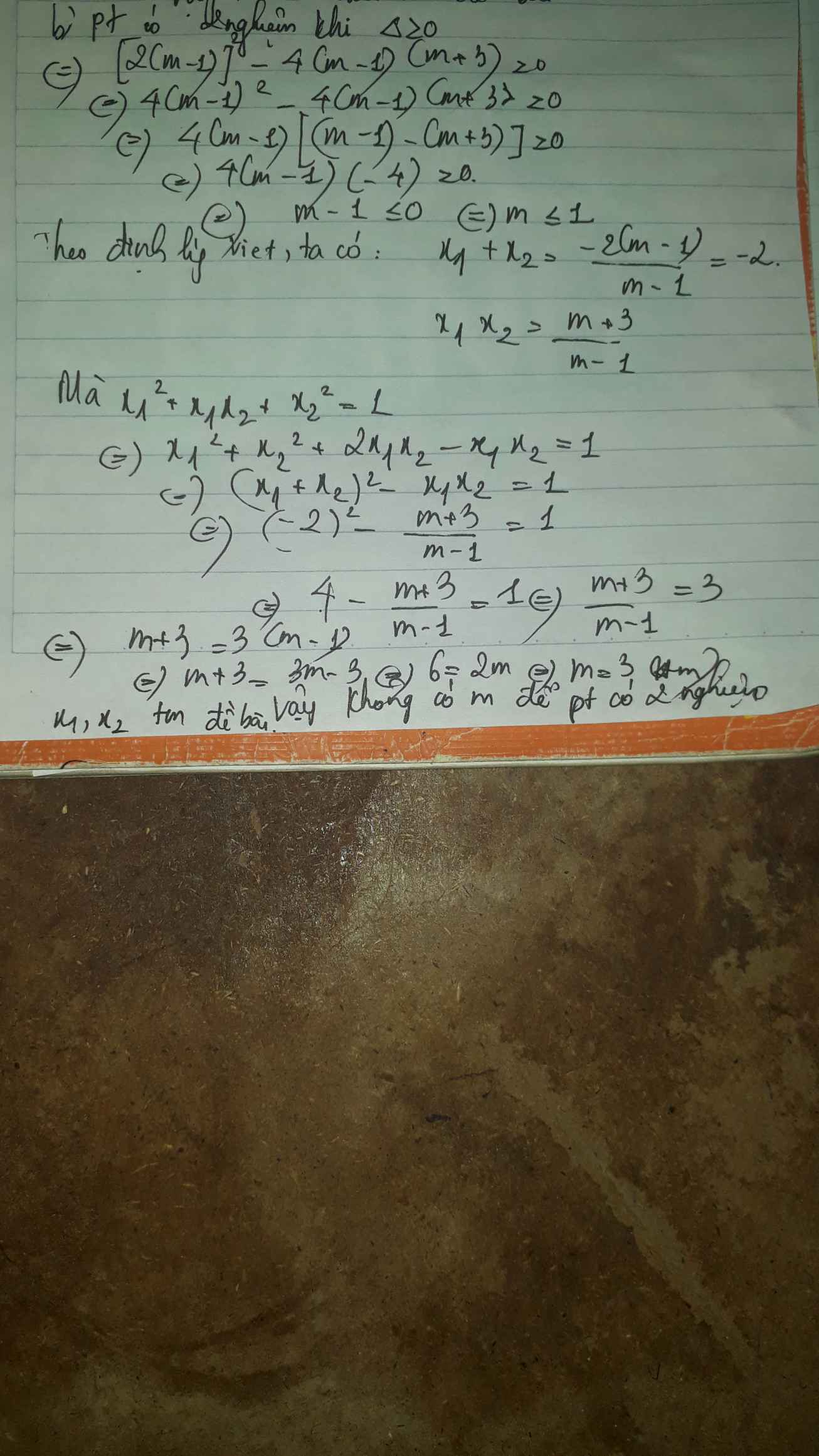Hãy nhập câu hỏi của bạn vào đây, nếu là tài khoản VIP, bạn sẽ được ưu tiên trả lời.

1: \(\text{Δ}=\left(2m-2\right)^2-4\left(m-3\right)\)
\(=4m^2-8m+4-4m+12\)
\(=4m^2-12m+16\)
\(=\left(2m-3\right)^2+7>0\)
Do đó: Phương trình luôn có hai nghiệm phân biệt
2: Theo vi-et, ta được:
\(\left\{{}\begin{matrix}x_1+x_2=2m-2\\x_1x_2=m-3\end{matrix}\right.\)
Ta có: \(\dfrac{x_1}{x_2}+\dfrac{x_2}{x_1}=x_1x_2\)
\(\Leftrightarrow x_1^2+x_2^2=\left(m-3\right)^2\)
\(\Leftrightarrow\left(2m-2\right)^2-2\left(m-3\right)-\left(m-3\right)^2=0\)
\(\Leftrightarrow4m^2-16m+4-2m+6-m^2+6m-9=0\)
\(\Leftrightarrow3m^2-12m+1=0\)
\(\text{Δ}=\left(-12\right)^2-4\cdot3\cdot1=144-12=132>0\)
Do đó: Phương trình có hai nghiệm phân biệt là:
\(\left\{{}\begin{matrix}x_1=\dfrac{12-2\sqrt{33}}{6}=\dfrac{6-\sqrt{33}}{3}\\x_2=\dfrac{6+\sqrt{33}}{3}\end{matrix}\right.\)

\(\Delta=\left[-2\left(m+1\right)\right]^2-4\left(m^2-3\right)\)
\(=4m^2+8m+4-4m^2+12=8m+16\)
Để phương trình có hai nghiệm thì 8m+16>=0
hay m>=-2
Áp dụng hệ thức Vi-et, ta được:
\(\left\{{}\begin{matrix}x_1+x_2=2\left(m+1\right)\\x_1x_2=m^2-3\end{matrix}\right.\)
Theo đề, ta có: \(x_1^2+x_2^2+1=3x_1x_2\)
\(\Leftrightarrow\left(x_1+x_2\right)^2-5x_1x_2+1=0\)
\(\Leftrightarrow\left(2m+2\right)^2-5\left(m^2-3\right)+1=0\)
\(\Leftrightarrow4m^2+8m+4-5m^2+15+1=0\)
\(\Leftrightarrow-m^2+8m+20=0\)
=>(m-10)(m+2)=0
=>m=10 hoặc m=-2
a, \(\Delta'=\left(m+1\right)^2-\left(m^2-3\right)=m^2+2m+1-m^2+3=2m+4\)
Để pt có 2 nghiệm x1 ; x2 khi \(\Delta'\ge0\Leftrightarrow m\ge-2\)
Theo Vi et \(\left\{{}\begin{matrix}x_1+x_2=2m+2\\x_1x_2=m^2-3\end{matrix}\right.\)
Ta có : \(\dfrac{x_1}{x_2}+\dfrac{x_2}{x_1}+\dfrac{1}{x_1x_2}=3\Leftrightarrow\dfrac{\left(x_1+x_2\right)^2-2x_1x_2+1}{x_1x_2}=3\)
\(\Leftrightarrow\dfrac{4\left(m^2+2m+1\right)-2\left(m^2-3\right)+1}{m^2-3}=3\)
\(\Rightarrow2m^2+8m+11=3m^2-9\Leftrightarrow m^2-8m-20=0\Leftrightarrow m=10;m=-2\)(tm)

a, bạn tự làm
b, \(\Delta'=\left(m+2\right)^2-\left(m^2+m+3\right)=m^2+4m+4-m^2-m-3\)
\(=3m+1\)để pt có 2 nghiệm \(m\ge-\dfrac{1}{3}\)
Ta có \(\dfrac{x_1^2+x_2^2}{x_1x_2}=4\Leftrightarrow\dfrac{\left(x_1+x_2\right)^2-2x_1x_2}{x_1x_2}=4\Rightarrow\left(x_1+x_2\right)^2-6x_1x_2=0\)
\(\Rightarrow4\left(m+2\right)^2-6\left(m^2+m+3\right)=0\)
\(\Leftrightarrow4m^2+16m+16-6m^2-6m-18=0\)
\(\Leftrightarrow-2m^2+10m-2=0\Leftrightarrow m^2-5m+1=0\Leftrightarrow m=\dfrac{5\pm\sqrt{21}}{2}\)(tm)

a: Thay m=-5 vào (1), ta được:
\(x^2+2\left(-5+1\right)x-5-4=0\)
\(\Leftrightarrow x^2-8x-9=0\)
=>(x-9)(x+1)=0
=>x=9 hoặc x=-1
b: \(\text{Δ}=\left(2m+2\right)^2-4\left(m-4\right)=4m^2+8m+4-4m+16=4m^2+4m+20>0\)
Do đó: Phương trình luôn có hai nghiệm phân biệt
\(\dfrac{x_1}{x_2}+\dfrac{x_2}{x_1}=-3\)
\(\Leftrightarrow x_1^2+x_2^2=-3x_1x_2\)
\(\Leftrightarrow\left(x_1+x_2\right)^2+x_1x_2=0\)
\(\Leftrightarrow\left(2m+2\right)^2+m-4=0\)
\(\Leftrightarrow4m^2+9m=0\)
=>m(4m+9)=0
=>m=0 hoặc m=-9/4

b) phương trình có 2 nghiệm \(\Leftrightarrow\Delta'\ge0\)
\(\Leftrightarrow\left(m-1\right)^2-\left(m-1\right)\left(m+3\right)\ge0\)
\(\Leftrightarrow m^2-2m+1-m^2-3m+m+3\ge0\)
\(\Leftrightarrow-4m+4\ge0\)
\(\Leftrightarrow m\le1\)
Ta có: \(x_1^2+x_1x_2+x_2^2=1\)
\(\Leftrightarrow\left(x_1+x_2\right)^2-2x_1x_2=1\)
Theo viet: \(\left\{{}\begin{matrix}x_1+x_2=-\dfrac{b}{a}=2\left(m-1\right)\\x_1x_2=\dfrac{c}{a}=m+3\end{matrix}\right.\)
\(\Leftrightarrow\left[-2\left(m-1\right)^2\right]-2\left(m+3\right)=1\)
\(\Leftrightarrow4m^2-8m+4-2m-6-1=0\)
\(\Leftrightarrow4m^2-10m-3=0\)
\(\Leftrightarrow\left[{}\begin{matrix}m_1=\dfrac{5+\sqrt{37}}{4}\left(ktm\right)\\m_2=\dfrac{5-\sqrt{37}}{4}\left(tm\right)\end{matrix}\right.\Rightarrow m=\dfrac{5-\sqrt{37}}{4}\)

a, \(x^2-4x+3=0\Leftrightarrow x^2-x-3x+3=0\)
\(\Leftrightarrow x\left(x-1\right)-3\left(x-1\right)=0\Leftrightarrow\left(x-3\right)\left(x-1\right)=0\Leftrightarrow\orbr{\begin{cases}x=3\\x=1\end{cases}}\)
Vậy tập nghiệm của phương trình là S = { 1 ; 3 }
b, Ta có : \(\Delta=\left(2m+2\right)^2-4\left(2m-5\right)=4m^2+8m+4-8m+20=4m^2+24>0\forall m\)
Theo Vi et ta có : \(\hept{\begin{cases}x_1+x_2=-\frac{b}{a}=2m-2\\x_1x_2=\frac{c}{a}=2m-5\end{cases}}\)
Ta có : \(\left(x_1^2-2mx_1-x_2+2m-3\right)\left(x_2^2-2mx_2-x_1+2m-3\right)=19.1=1.19\)
TH1 : \(\hept{\begin{cases}x_1^2-2mx_1-x_2+2m-3=19\\x_2^2-2mx_2-x_1+2m-3=1\end{cases}}\)
Lấy phương trình (1) + (2) ta được :
\(x_1^2+x_2^2-2mx_1-2mx_2-x_2-x_1+4m-6=20\)
mà \(\left(x_1+x_2\right)^2=4m^2+8m+4\Rightarrow x_1^2+x_2^2=4m^2+8m+4-2x_1x_2\)
\(=4m^2+8m+4-2\left(2m-5\right)=4m^2+4m-6\)
\(\Leftrightarrow4m^2+4m-6-2m\left(2m-2\right)-\left(2m-2\right)+4m-6=20\)
\(\Leftrightarrow4m^2+4m-6-4m^2+4m-2m+2+4m-6=20\)
\(\Leftrightarrow10m=30\Leftrightarrow m=3\)tương tự với TH2, nhưng em ko chắc lắm vì dạng này em chưa làm bao giờ

(a) Khi \(m=2,\left(1\right)\Leftrightarrow x^2-4x-5=0\left(2\right)\).
Phương trình (2) có \(a-b+c=1-\left(-4\right)+\left(-5\right)=0\)
\(\Rightarrow\left[{}\begin{matrix}x=-1\\x=-\dfrac{c}{a}=5\end{matrix}\right.\).
Vậy: Khi \(m=2,S=\left\{-1;5\right\}\).
(b) Điều kiện: \(x_1,x_2\ne0\Rightarrow m\in R\)
Phương trình có nghiệm khi:
\(\Delta'=\left(-m\right)^2-1\cdot\left(-m^2-1\right)\ge0\)
\(\Leftrightarrow2m^2+1\ge0\left(LĐ\right)\)
Suy ra, phương trình (1) có nghiệm với mọi \(m\).
Theo định lí Vi-ét: \(\left\{{}\begin{matrix}x_1+x_2=-\dfrac{b}{a}=2m\\x_1x_2=\dfrac{c}{a}=-m^2-1\end{matrix}\right.\)
Theo đề: \(\dfrac{x_1}{x_2}+\dfrac{x_2}{x_1}=-\dfrac{5}{2}\)
\(\Leftrightarrow\dfrac{x_1^2+x_2^2}{x_1x_2}=-\dfrac{5}{2}\Leftrightarrow\dfrac{\left(x_1+x_2\right)^2-2x_1x_2}{x_1x_2}=-\dfrac{5}{2}\)
\(\Leftrightarrow2\left(x_1+x_2\right)^2+x_1x_2=0\)
\(\Leftrightarrow2\left(2m\right)^2+\left(-m^2-1\right)=0\)
\(\Leftrightarrow7m^2=1\Leftrightarrow m=\pm\dfrac{\sqrt{7}}{7}\) (thỏa mãn).
Vậy: \(m=\pm\dfrac{\sqrt{7}}{7}.\)

1,
Thay m=4 phuong trình đã cho trở thành : \(x^2-9x+20=0\)
\(\Delta=81-80=1\) \(>0\) nên phương trình đã cho có hai nghiệm phân biệt \(x_1=5\) và \(x_2=4\).
2,
Ta có \(\Delta=\left(2m+1\right)^2-4\left(m^2+m\right)=1>0\) với mọi \(m\) nên phuong trình đã cho có hai nghiệm phân biệt
\(x_1,x_2\) với mọi \(m.\)
Áp dụng định lý Vi-et : \(\hept{\begin{cases}x_1+x_2=2m+1\\x_1x_2=m^2+m\end{cases}}\)
\(\Rightarrow x_1^2+x_2^2-5x_1x_2=-17\) \(\Leftrightarrow\left(x_1+x_2\right)^2-7x_1x=-17\Leftrightarrow\left(2m+1\right)^2-7\left(m^2+m\right)=-17\Leftrightarrow m^2+m-6=0\)
\(\Rightarrow\hept{\begin{cases}m=-3\\m=2\end{cases}}\)




Lời giải:
Để pt có 2 nghiệm $x_1,x_2$ thì:
$\Delta'=1+(3+m)=4+m\geq 0\Leftrightarrow m\geq -4$ (chứ không phải với mọi m như đề bạn nhé)!
Áp dụng định lý Viet: \(\left\{\begin{matrix} x_1+x_2=-2\\ x_1x_2=-(m+3)\end{matrix}\right.\)
$x_1, x_2\neq 0\Leftrightarrow -(m+3)\neq 0\Leftrightarrow m\neq -3$
$\frac{x_1}{x_2}-\frac{x_2}{x_1}=\frac{-8}{3}$
$\Leftrightarrow \frac{x_1^2-x_2^2}{x_1x_2}=\frac{-8}{3}$
$\Leftrightarrow \frac{-2(x_1-x_2)}{-(m+3)}=\frac{-8}{3}$
$\Leftrightarrow x_1-x_2=\frac{4}{3}(m+3)$
$\Rightarrow (x_1-x_2)^2=\frac{16}{9}(m+3)^2$
$\Leftrightarrow (x_1+x_2)^2-4x_1x_2=\frac{16}{9}(m+3)^2$
$\Leftrightarrow 4+4(m+3)=\frac{16}{9}(m+3)^2$
$\Leftrightarrow m+3=3$ hoặc $m+3=\frac{-3}{4}$
$\Leftrightarrow m=0$ hoặc $m=\frac{-15}{4}$ (đều thỏa mãn)